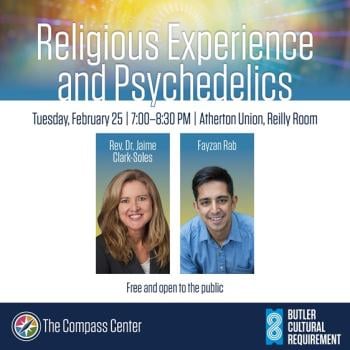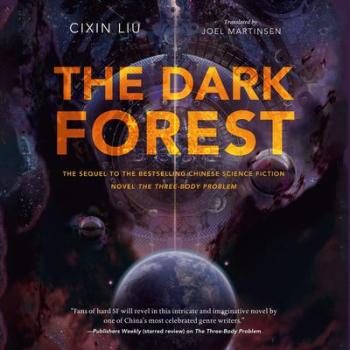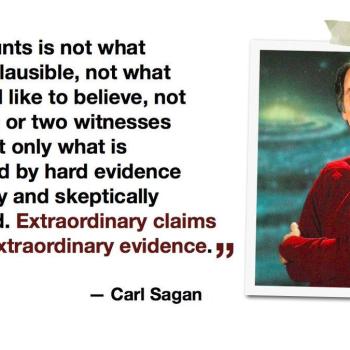Towards the end of last semester, I found myself growing increasingly fascinated – to the point of contemplating taking on yet another new research direction – with religious language used in recent debates about ecology, the environment, and conservation, as I participated in a faculty discussion group that is hosted by the Science, Technology, and Environmental Studies program at Butler University. There were so many ways that religion came up, from the emphasis of representatives of the “New Conservationism” that the Earth doesn’t need a savior, to the frequent references to the Garden of Eden by all sides, to Donna Haraway’s evocation of Cthulhu in coming up with a name for what is typically called the Anthropocene: the era in which humanity’s global impact is visible in the geological record in a way that no other living things have been. Other suggestions besides the Anthropocene and the Cthulhucene include the Capitalocene, the Narcisscene, and the Megalayan (as a subdivision of the Holocene). If we’re going to playfully explore possible labels, I’ll throw one into the mix: The Monopostocene. If the roots of that term are not clear, I explain it below.
Gabrielle Hecht emphasizes in an article in Aeon that the “we” that is in view when people talk about the imminent danger to the Earth – caused by “us” and threatening “us” – looks and sounds very different depending on where one is situated in the world. It strikes me as ironic and yet unsurprising that, in the very act of situating ourselves as central to the unfolding narrative of global history, we fail to notice that we cannot and should not situate all of humankind together – unless we mean it. Not all have caused climate change equally, and poor communities stand to bear the brunt of the impact. But we should stand united, and thus the article emphasizes:
If the Anthropocene is to have real value as a category of thought and a call to action, it must federate people and places, not just disciplines. It requires thinking from, and with, Africa. ‘They’ are ‘us’, and there is no planetary ‘we’ without them.
On the other hand, it is precisely because even terms like “capitalocene” do not do justice to the way capitalism is steered by some upon the backs of others, benefits some at the expense of others, that I propose the term “monoposostocene”: the geological epoch during which we saw the impact on a global scale, visible in the geological record, not so much of humanity as a whole, but of the economic top 1% of humanity in terms of income and/or wealth.
Of related interest, there is also an obvious connection between the notion of the anthropocene and Pierre Teilhard de Chardin’s talk of the noosphere. Teilhard has been in the news a lot lately, because of the document rediscovered in the Vatican archive. See recent articles by Paul Bentley and David Grumett in The Christian Century for more about that. Elsewhere, Amal Ahmed wrote about the intersection of environmental and racial justice. And Andii Bowsher wrote:
[T]he real task is not to de-centre ourselves but to learn to value all and not to value ourselves ‘more highly than we ought’ (Apostle Paul’s phrase). In fact, the example of Jesus is (surprise, surprise) one to take seriously. “Who though in the form of God did not consider equality with God something to be held onto … emptying himself …” in other words ‘though the centre of God’s design, nevertheless de-centred himself -becomeing the servant of others.
So, I reckon that the Christian traditions are not necessarily anthropocentric…
This tweet is also of relevance:
I was on a panel with some “free market environmentalists” (funded by Chevron). One of them said that if the present net-value of a grizzly bear dropped below zero it should be allowed to go extinct. I asked if he’d apply the same standard to humans. His answer: “In theory.” https://t.co/Z2h2TQnswt
— Jeffrey St. Clair (@JSCCounterPunch) April 5, 2018
I haven’t seen it yet but Annihilation is apparently relevant to the theme of this blog post. See too what I wrote about the movie Avatar a number of years ago. This post also intersects with sci-fi utopianism and dystopianism, which was the subject of a recent article on IO9 about Star Trek: Deep Space Nine. It includes this quote from Cmd. Sisko: “It’s easy to be a saint in paradise, but the Maquis do not live in paradise.” And it concludes:
After The Next Generation preached about how humanity’s problems were solved, Deep Space Nine argued that utopia is not the end of the story, that in order to achieve Roddenberry’s humanitarian values we must be constantly vigilant, unafraid to challenge societies that seem perfect, especially if those societies offer us a comfortable life.
ASLE has a call for papers related to the anthropocene, as does the Ian Ramsey Center. See also Erin Gerecke’s post about the Great Lakes and humanity’s entangled stories. And of more distantly related interest, see the blog post by Aaron Adair about Lovecraft and the Christmas star.
Finally, here’s an image by artist Brian Nichols, a campaign poster for Cthulhu 2020:















